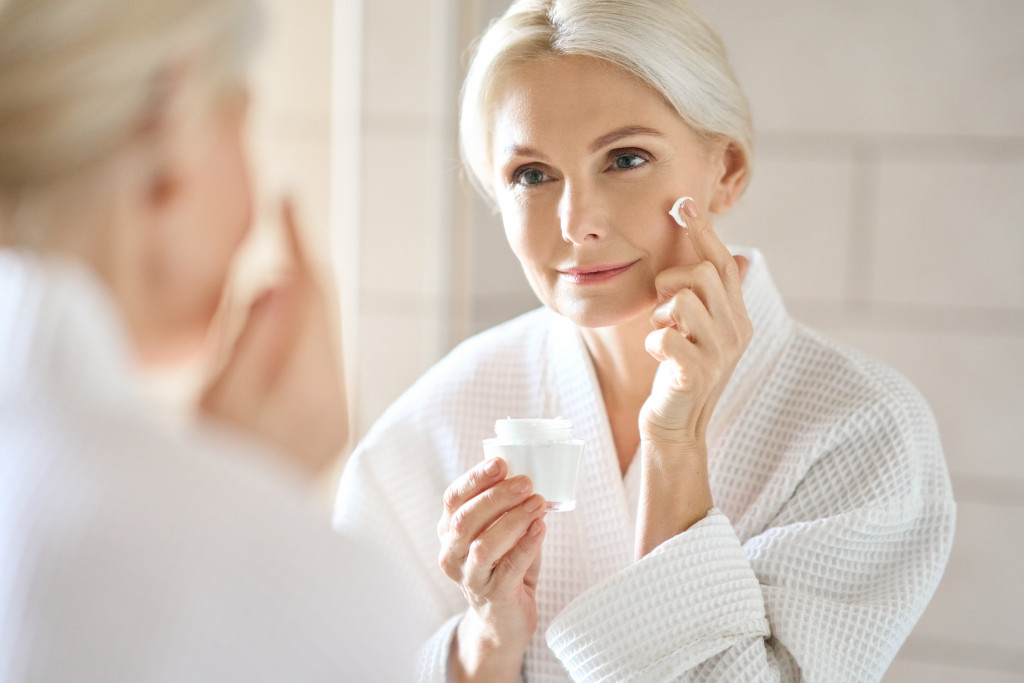In this day and age, almost everyone is concerned about their skin. Whether you suffer from acne or scarring or want to maintain a clear complexion, you can take steps to improve your skin health.
Wash your face properly
The first step to maintaining clear skin is ensuring you are washing your face. To make sure your face is as clean as can be, choose the right cleanser. Not all cleansers are created equal. You need to find one that suits your skin type—whether it’s dry, oily, or somewhere in between—and contains ingredients that will be gentle on your skin. If you’re unsure where to start, ask a dermatologist or skincare expert for recommendations.
Also, use lukewarm water—not hot. When you use water that’s too hot, you can strip away your skin’s natural oils, leaving it feeling dry and irritated. Stick to lukewarm water instead so you don’t end up doing more harm than good.
Additionally, always be gentle with your skin. Avoid scrubbing your face too hard with a washcloth or exfoliating scrub. This can damage your skin and leave it feeling raw. Instead, use gentle circular motions when cleansing, so you don’t irritate your skin further.
Don’t forget about your neck. Many people focus on washing their faces but forget about their necks altogether. Remember to cleanse this area gently as well, so you don’t end up with breakouts or razor burn later on.
Use skincare products
To keep your skin clear, build a skincare routine that works for you and that you’ll stick to. If this means you need to buy products, ensure you first decide which kind you need. This will be based on your skin type and your goals for your skin. For example, if you’re trying to reduce wrinkles, you might need a different set of products than someone who’s trying to clear up acne.
As a general rule of thumb, most people need at least a cleanser, toner, moisturizer, and sunscreen (yes – even in the winter!). If you’re not sure where to start, it’s best to do a quick search or survey of online cosmetic skin solutions or to talk to a dermatologist or esthetician. They’ll be able to help you create a custom skincare routine that’s perfect for your individual needs.
The most important thing when it comes to skincare is being consistent. A lot of people give up on their routines because they don’t see results immediately. But the truth is consistency is key when it comes to achieving long-term results. So make sure to stick with it!

Eat a healthy diet
Just like the rest of your body, your skin needs nutrients to stay healthy. Essential vitamins and minerals play a vital role in keeping skin looking its best. That’s why you should ensure you eat plenty of fruits and vegetables. These are packed full of vitamins and minerals that are essential for healthy skin. Make sure to eat a variety of colors to get the most benefit.
Also, get enough protein. Protein is essential for maintaining and repairing skin cells. Choose lean protein sources such as chicken, fish, tofu, legumes, and nuts.
At the same time, limit processed foods. Processed foods are high in sugar and unhealthy fats that can damage the skin. Opt for whole, unprocessed foods whenever possible.
It’s also extremely necessary to stay hydrated. Drinking plenty of water is key for keeping skin hydrated and plump. Aim for eight glasses of water per day.
And as much as possible, don’t smoke cigarettes. Smoking cigarettes speed up the aging process and damages skin cells beyond repair. If you smoke, quitting is the best thing you can do for your skin – and your health!
Get enough sleep
You probably already know that getting enough sleep is important for overall health, but did you know that it can also have a positive impact on your skin? That’s right – getting enough shut-eye is one of the best things you can do for your skin.
In fact, when it comes to skin health, sleep is just as important as a healthy diet. During sleep, our bodies produce more collagen – a protein that helps keep skin youthful and elastic. Not getting enough sleep can affect collagen production, which can give rise to fine lines, wrinkles, and dull-looking skin. In addition, lack of sleep can cause the skin to appear puffy and increase the likelihood of developing dark under-eye circles.
If you’re not getting enough sleep, there are a few simple things you can do to change that. First, aim for 7-8 hours of sleep per night. This may seem like a lot, but it’s important to give your body the time it needs to fully recover from the day’s activities.
Second, create a bedtime routine and stick to it as much as possible. This means winding down for 30 minutes before going to bed by reading or taking a relaxing bath. Lastly, make sure your sleeping environment is conducive to rest by keeping the room cool, dark, and quiet.
There are many things you can do to maintain clear skin. Washing your face properly, using skincare products, getting enough sleep, and eating a healthy diet are all good places to start.

